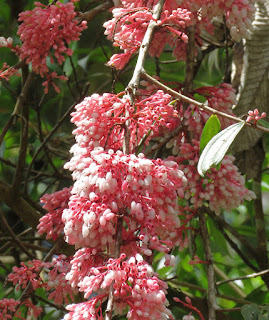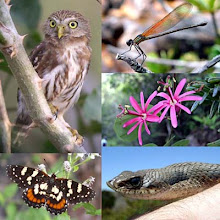This is a
quick blog with just a few plants from my spring birding tour to Costa Rica,
which took place in mid-March.
There are
many members of the Ericaceae in the tropical highlands, even familiar genera
such as Vaccinium and Gaultheria. This showy one is only
tropical, Thibaudia costaricensis,
and offers nectar for hummingbirds such as the White-bellied Mountain-gem.
I’m always
drawn to members of the Gesneriaceae, the most well known member of which is
the African Violet (not even close to being a true violet). I saw two members
of this family that I’d never seen before. This one from Tapantí-Macizo de le
Muerte National Park is Kohleria tigridia,
also known as Capanea grandiflora. It
seems the nomenclatural confusion hasn’t been sorted out yet.
This
gesneriad is Solenophora calycosa,
blooming along stream high in the mountains above Savegre Lodge.
Common in
the Cerro de la Muerte highlands is this fantastically enormous thistle, Cirsium subcoriaceum. It’s a favorite of
the Magnificent Hummingbird (which when split will be called the Admirable
Hummingbird).
Growing near
the thistle was this Nasa speciosa, a
member of the stickleaf family, Loasaceae. Instead of having a velcro-like
texture, the whole plant is covered in many venom-filled bristles, worse than
stinging nettle.
On the
Caribbean slope at Sueño Azul I took note of just this one member of the
Melastomataceae, Conostegia subcrustulata.
The online digital flora of La Selva Biological Station was great help in
getting names for plants in this region.
Also on our
lodge grounds (not sure if it was growing wild or planted) was this orchid, Ionopsis utricularioides one of very few
orchids in bloom this time of year. The specific epithet tells that the flowers
look very much like a bladderwort in the genus Utricularia – whose flowers in turn are often called orchid-like!
Here’s a Utricularia sp. from my recent northern
Peru tour for comparison.
Finally, I
happened to notice this cycad Zamia
neurophyllidia along the trail at Braulio Carrillo National Park. This one
is in the Zamiaceae and may be a host plant for the cycadian butterfly Eumaeus godartii (though Zamia skinneri is identified as the host
plant on the Butterflies of American website, and that species of cycad is not
listed as occurring in the La Selva region).
















No comments:
Post a Comment